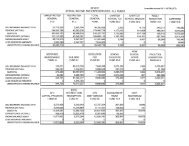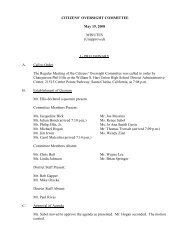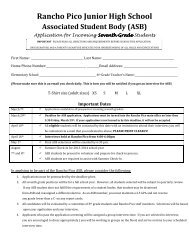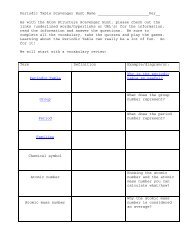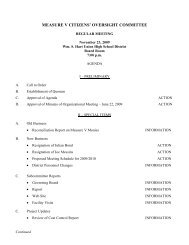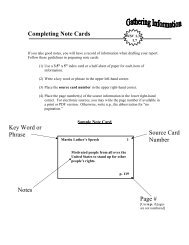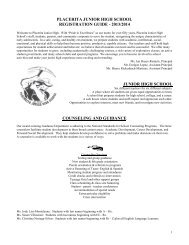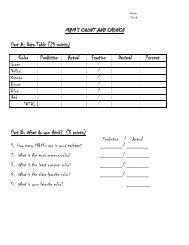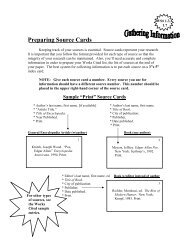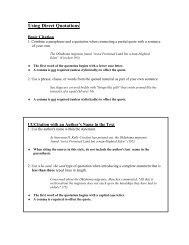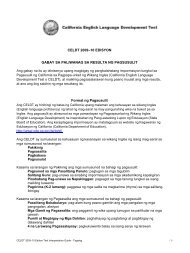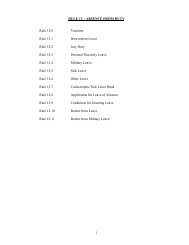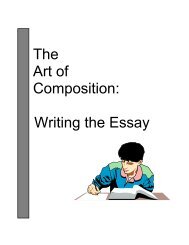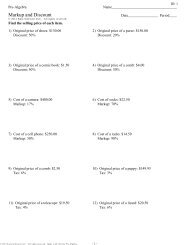Safe School Plan - William S. Hart Union High School District
Safe School Plan - William S. Hart Union High School District
Safe School Plan - William S. Hart Union High School District
You also want an ePaper? Increase the reach of your titles
YUMPU automatically turns print PDFs into web optimized ePapers that Google loves.
Recommendations for the public<br />
The following table provides a general list of probable health effects at each level, and associated recommended cautionary statements. It is<br />
based on the EPA’s Air Pollution Index, as well as some work done in Montana and Washington.<br />
Categories Health Effect Cautionary Statement<br />
Good None None<br />
Moderate<br />
Unhealthy for Sensitive Groups<br />
Possibility of aggravation of heart or<br />
respiratory disease.<br />
Increasing likelihood of respiratory<br />
symptoms and aggravation of lung disease<br />
such as asthma.<br />
People with heart or lung disease should pay<br />
attention to symptoms.<br />
People with respiratory or heart disease, the<br />
elderly and children should limit prolonged<br />
exertion and stay indoors when possible.<br />
Unhealthy<br />
Increased respiratory symptoms and<br />
aggravation of lung and heart diseases;<br />
possible respiratory effects to general<br />
population.<br />
People with respiratory or heart disease, the<br />
elderly and children should avoid prolonged<br />
exertion and stay indoors when possible;<br />
everyone else should limit prolonged<br />
exertion.<br />
Very Unhealthy<br />
Significant increase in respiratory symptoms<br />
and aggravation of existing lung and heart<br />
disease; increasing likelihood of respiratory<br />
effects of general population.<br />
People with respiratory or heart disease, the<br />
elderly and children should avoid any<br />
outdoor activity; everyone else should avoid<br />
any outdoor exertion.<br />
Hazardous<br />
Serious aggravation of heart or lung disease<br />
and premature mortality in persons with<br />
cardiopulmonary disease and the elderly;<br />
serious risk of respiratory effects in general<br />
population.<br />
Everyone should avoid any indoor and<br />
outdoor exertion; everyone should remain<br />
indoors whenever possible.<br />
Specific strategies<br />
Staying Indoors: The most common advisory issued during a smoke pollution episode is to stay indoors. The usefulness of this strategy<br />
depends entirely on how clean the indoor air is. Studies (almost none of which were conducted during forest fire smoke episodes) indicate<br />
that this strategy can usually provide some protection, especially in a tightly closed, air conditioned house. Staying inside can usually reduce<br />
ambient air pollution by about a third. In non-air conditioned homes anywhere from 70 to 100% of fine particulate will penetrate indoors<br />
from the outside air. In very leaky homes and buildings, the guidance of staying inside with doors and windows closed may offer little<br />
protection. Certainly, if doors and windows are left open, indoor and outdoor air will be about the same. One of the biggest problems with<br />
advising people to stay inside during smoke events is the risk of heat stress. The fire season is often accompanied by high outside<br />
temperatures and for those people who depend upon open windows and doors for ventilation, keeping windows and doors closed can be a<br />
problem. Older individuals and others in frail health run the risk of heat exhaustion or heat stroke which could have dire consequences. If<br />
outside temperatures are very high, it would be prudent to advise those without air conditioning to seek shelter in a clean air sanctuary. These<br />
are discussed later in this guide.<br />
Smoke events can last several weeks or months. These longer events are usually punctuated by times with relatively clean air. When air<br />
quality improves, even temporarily, residents should “air out” their homes to reduce indoor air pollution.<br />
Air conditioners: Little is known about the impact of using various types of air conditioners and air filters on indoor air pollutant<br />
concentrations. The conventional wisdom is that air conditioners reduce the amount of outside particulate to get indoors, if for no other<br />
reason than air conditioned homes usually have lower air exchange rates than homes that use open windows for ventilation. Some air<br />
conditioners can be fitted with HEPA filters (stands for <strong>High</strong> Efficiency Particulate ) These filters can capture most of the tiny particles<br />
associated with smoke and can further reduce the amount of outside air pollution that gets indoors.<br />
68




